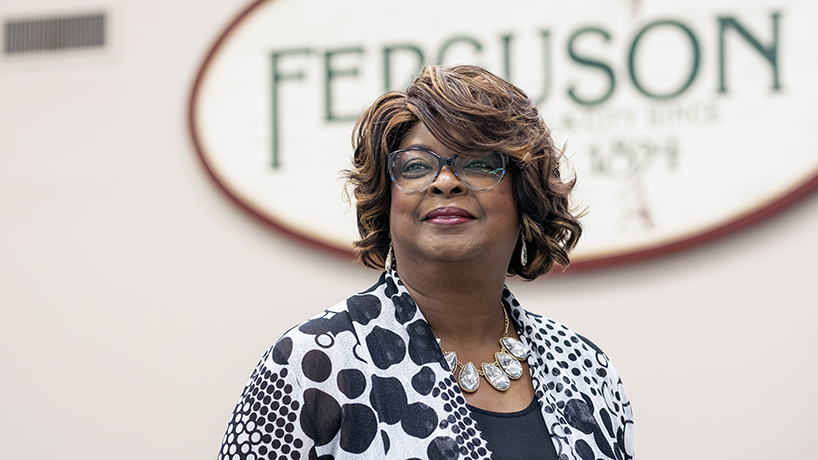
Ella Jones entered politics in 2015 after a successful career as a chemist and Mary Kay consultant and sales director. Jones became Ferguson’s first Black city councilor and then mayor in 2020. Her background in chemistry, especially her experience collecting data, has been useful to her campaigns for office. (Photos by August Jennewein)
When Ella Jones speaks, she is personable, unflinchingly positive about the future, yet also analytical.
These are traits of a natural politician, but the University of Missouri–St. Louis alumna says it was her late husband who had an innate interest in politics, not her.
“I never had an interest in politics,” she says with an effusive laugh. “My husband was the political person in the family. He was in the Ferguson Township Open Democratic Club. He would go to all these political meetings and drag me along with him.”
That changed after her husband Tim’s passing in 2013 and the 2014 fatal shooting of Michael Brown
in Ferguson, Missouri. Looking for a challenge and a way to support her community, Jones ran for and won a seat on the Ferguson City Council in 2015.
It was the first time a Black resident was elected to the council, despite making up 67 percent of the population. In June, she made history again as the first woman and Black resident elected mayor of the city. It’s a moment she — and many other Ferguson residents — will never forget.
“When I looked at the results, I was not leading for the first round,” she recalls. “I got up and said, ‘This is not happening.’ My campaign manager, policy director and field instructor all said, ‘Sit down. Don’t worry about it. We’ll watch the returns.’ Later, they came over and said, ‘You won with 1,500 votes.’ They convinced me the numbers were correct, and I jumped up, hollering and having a good time.”
Her momentous entry into politics came after earning a bachelor’s degree in chemistry from UMSL and successful careers in two fields – experiences that would be essential to her work in local government.
Jones’ interest in science and mathematics started at a young age.
“When I was in high school, I was good at math, and I always wanted to be a chemical engineer or a pharmacist,” she says, explaining that she’d married and taken a break from school. “When I went back, I took up chemistry.”
She attended St. Louis Community College – Florissant Valley for two years before finishing her BA in chemistry at UMSL in 1986.
“It was a great experience,” she says. “Three people played a major role in me staying in the chemistry department. Dr. Rudolph Ernest Winter, he was the organic lab professor. He was always challenging us to do more and more. Of course, Dr. Charles Armbruster for organic chemistry. He would take time to make sure we understood everything. Then, Dr. Lawrence Barton, the chair of the department. If he could do anything to help us, he would.”
After graduation, Jones embarked on a career as a chromatographer and analytic chemist synthesizing peptides and amino acids in the Department of Biochemistry and Molecular Biophysics at the Washington University School of Medicine in St. Louis.
In her next position at the KV Pharmaceutical Company, she focused on dissolutions and time-release drugs. For the 30 years Jones worked in labs, she also juggled roles as a Mary Kay consultant, then sales director.
Peptides are far from the world of politics, but the analytical nature of chemistry, especially collecting data, has been incredibly useful to Jones.
To prepare to run for office, Ella Jones attended the Sue Shear Institute for Women in Public Life at UMSL. It gave her a foundation in municipal leadership principles and campaigning. (Photo courtesy of the Urban League)
“It’s the key to everything that I do,” she says. “I don’t do anything without the results in mind. When you’re in the lab running an experiment, you have to look beyond what’s going on for the results.”
Appropriately, her campaigns are run by the numbers with quantitative goals tracked for growth.
“Staff members would come in, and I would ask, ‘How many people did you talk to today? How many positive responses?’” Jones says. “I got that from being in chemistry.”
There were basic aspects of running for office Jones wanted to learn before her first election. At the suggestion of a friend, she returned to UMSL for training in municipal leadership at the Sue Shear Institute for Women in Public Life.
“It was very helpful,” she says. “It helped me to understand the quality of literature I needed to put out, getting quality people to support you, fundraising.”
A seat on the Ferguson City Council was a start, but Jones aimed for more.
“I ran for city council knowing that I was going to run for mayor,” she says. “When I told people that my next step would be mayor, they laughed. But that’s the next progression. I’m not going to be satisfied just sitting in one seat.
“The higher you go, the more elevated your platform is, so I had to be mayor. That comes from being in Mary Kay. You never want to be at the entry level. You always want to move up.”
That’s exactly what she did.
Now that she’s taken office, Jones is employing a servant-leadership model designed to empower her constituents. She’s already delivered a 90-day State of the City report and has been working with the Urban League on a housing initiative.
June’s election was historic and long overdue, but Jones wasn’t thinking about that during her campaign. More than the historic significance of her victory, she’s grateful to serve as a role model for those who have not felt represented.
“The only thing I was thinking about was, now the people have a voice,” she says. “The people have hope. That’s all I was thinking about, the people. They showed everyone who they wanted.”















